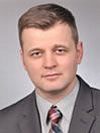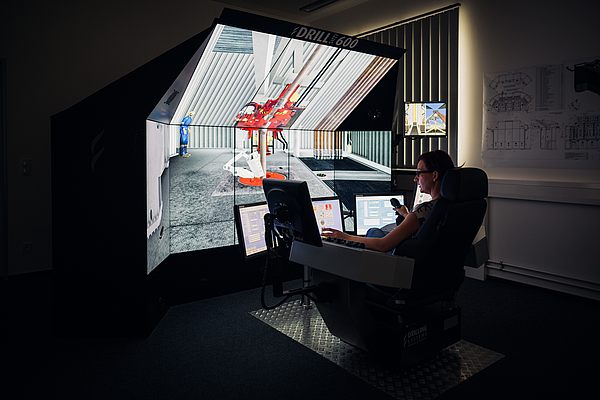Petroleum Engineering (Master)
Even in this era of transformation for climate protection and the energy system, the fossil fuels oil and natural gas remain an essential pillar of our society. By further developing traditional petroleum engineering techniques and new fields of application, such as the storage of energy generated through renewable sources and the use of deep geothermal systems, modern petroleum engineers make it possible to place the energy supply of the future on a more environmentally friendly footing. The consecutive master’s program in petroleum engineering trains students specifically for the fields of drilling and production, reservoir management, energy storage and distribution, and deep geothermal systems.
Jobs and careers
The demand for well-trained engineers in the field of petroleum technology and deep geothermal systems remains high. With its strong focus on practical application, this program qualifies graduates to carry out independent work as well as planning and leadership roles in and around the globally active petroleum industry. Such tasks include assessment and evaluation of oil and gas reserves, development and economic production, treatment of oil and natural gas, and storage and transportation of marketable products. Additional fields of professional activity involve energy storage and the use of the inner earth for geothermal energy and geological sequestration of CO2.
Potential employers for graduates of the master’s program include:
- Companies in the petroleum industry
- Energy supply and storage companies
- Companies providing service and support functions for the industry
- Associations and public bodies
- Research facilities and universities
- Engineering firms
- Corporate consultancies
Why Clausthal?
The master’s program in petroleum engineering at TU Clausthal deepens students’ expertise and imparts interdisciplinary knowledge. The M.Sc. degree qualifies graduates to continue their professional training with doctorate (Ph.D.) studies in engineering. The program is located at the Institute of Petroleum Engineering, which has superb equipment and highly qualified research and teaching staff, and is one of the few facilities of its kind in Germany. The program’s content is tailored to needs that have been identified by the petroleum industry. Supported by external lecturers from private industry, the program is very much geared towards real-world application. It is international in its perspective and is taught in English.
Program structure
The master’s program is designed to be completed over the course of four semesters (two years) and encompasses 15 modules. It is taught in English. The modular structure encompasses in-depth study of petroleum engineering, management, economics, and law. Students can cement their specialist knowledge and management skills through an optional semester abroad at a partner university, through hands-on project work in a petroleum company, or through an interdisciplinary group project. The program concludes with a master’s thesis. Three areas of specialization are available:
- Reservoir management
- Drilling and production
- Deep geothermal systems
Focus Reservoir Management
- Communication
- Management, economics and law
- Advanced reservoir mechanics
- Advanced production and well planning
- Data acquisition and evaluation
- Reservoir modeling and simulation
- Enhanced hydrocarbon recovery
- Seminar in advanced reservoir topics
- Group project
- Master’s thesis
Focus Drilling and Production
- Communication
- Management, economics and law
- Advanced reservoir mechanics
- Advanced production and well planning
- Advanced drilling and completion
- Directional drilling and logging
- Production
- Seminar in advanced drilling and production topics
- Group project
- Master’s thesis
Focus Deep Geothermal Systems
- Communication
- Management, economics and law
- Advanced reservoir mechanics
- Advanced production and well planning
- Data acquisition and evaluation
- Advanced drilling and completion
- Geothermal systems
- Seminar in advanced geothermal engineering topics
- Group project
- Master’s thesis

Drilling/Production
Erik Feldmann, M.Sc.
Phone: +49 5323 72-3912
Fax: +49 5323 72-3146
E-Mail: ma.drilling@tu-clausthal.de
Institute of Subsurface Energy Systems
Agricolastraße 10
38678 Clausthal-Zellerfeld

Reservoir Management
Bettina Jenei
Phone: +49 5323 72-2068
Fax: +49 5323 72-3146
E-Mail: bettina.jenei@tu-clausthal.de
Institute of Subsurface Energy Systems
Agricolastraße 10
38678 Clausthal-Zellerfeld

Deep Geothermal Systems
Prof. Dr.-Ing. habil. Michael Z. Hou
Phone: +49 5321 3816 8090
Fax: +49 5321 3816 8196
E-Mail: ma.geotherm@tu-clausthal.de
Energie-Forschungszentrum Niedersachsen
Am Stollen 19A
38640 Goslar

Prof. Dr. Leonhard Ganzer
Phone: +49 5323 72 3910
Fax: +49 5323 72 3146
E-Mail: leonhard.ganzer@tu-clausthal.de
Institute of Subsurface Energy Systems
Agricolastraße 10
38678 Clausthal-Zellerfeld
Studying in Clausthal
Start application now.
Program outline
Type of program: Master
Duration: 4 Semester
Language of teaching: English
Degree: Master of Science (M.Sc.)
Start date: Admission only to the winter semester.
Accreditation: EUR-ACE® - Master, Bescheid des Akkreditierungsrates
accredited until 30.09.2030
starting your studies
Welcome Weeks (before the start of lectures)
The Clausthal University of Technology supports the start of studies with various event formats.
Pre-course in mathematics (before the start of lectures)
The Institute of Mathematics offers a pre-course in mathematics for Bachelor's degree programmes. Master's students who would like to refresh their mathematics knowledge are also welcome to attend this course.
FAQ
Answers to frequently asked questions on the website of the Institute of Subsurface Energy Systems.
Prerequisites for the master’s program
The master’s program in petroleum engineering builds consecutively on the bachelor’s degree in energy and mineral resources (with a focus on petroleum engineering). The prerequisites for this program can also be fulfilled by a bachelor’s degree with a specialization in petroleum engineering from an accredited university (of applied sciences) or an equivalent qualification, in conjunction with good English skills. If the equivalence of the qualification is unclear, conditional admission may be possible.
Documents
Model study plan
only for AFB 2022
only for AFB 2015
Prüfungsordnung/Exam Regulations
- Allgemeine Prüfungsordnung_German
- General Exam Regulations_English
- Ausführungsbestimmungen (2022) gültig ab WS 22/23_German
- Executive Regulations (2022) valid from WS 22/23_English
- Ausführungsbestimmungen (2015)_gültig bis Ende SoSe 2025_German
- Executive Regulations (2015)_valid until the End of SoSe 2025_English
Zugangsordnung/Admission Regulation
- Studiengangsspezifische Zulassungsvoraussetzungen_German
- Specific admission regulation for Petroleum Engineering_English
- Allgemeine Zulassungsvoraussetzung_German
- General admission requirements_English
Compulsory Optional Subjects
only for AFB 2022
- Compulsory Optional Subjects WS 24/25 and SoSe 25_update 18.06.2024
- Compulsory Optional Subjects WS 23/24 and SS 24_update 13.06.2023
only for AFB 2015
- Compulsory Optional Subjects WS 24/25 and SoSe 25_update 18.06.2024
- Compulsory Optional Subjects WS 23/24 and SS 24_update 13.06.2023
Modul Manual
only for AFB 2022
only for AFB 2015
![[Translate to English:] [Translate to English:]](/fileadmin/_processed_/9/1/csm_Beachvolleyball_1_1a8913aa18.jpg)

